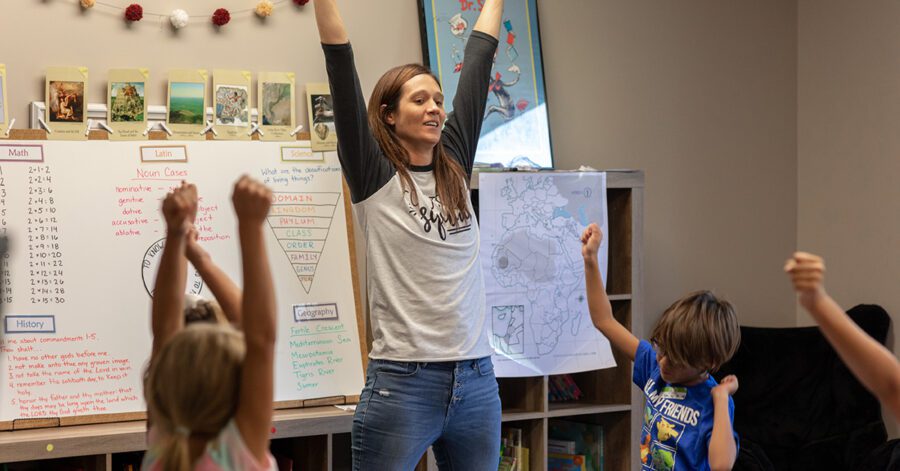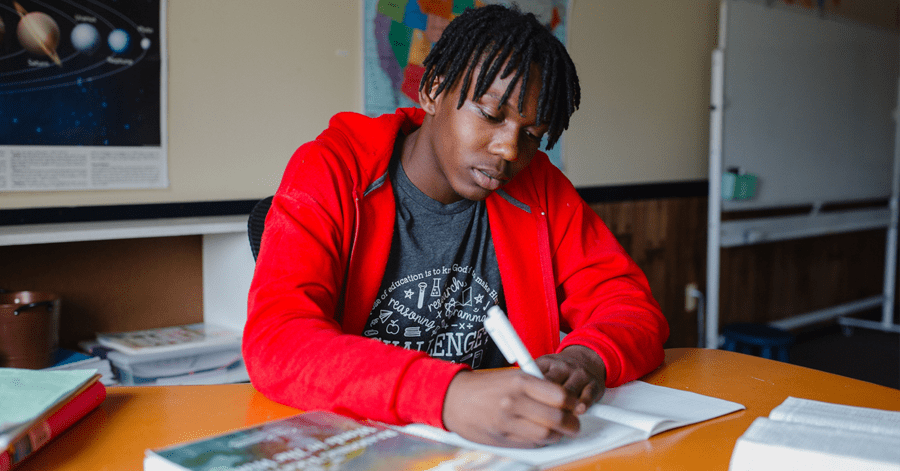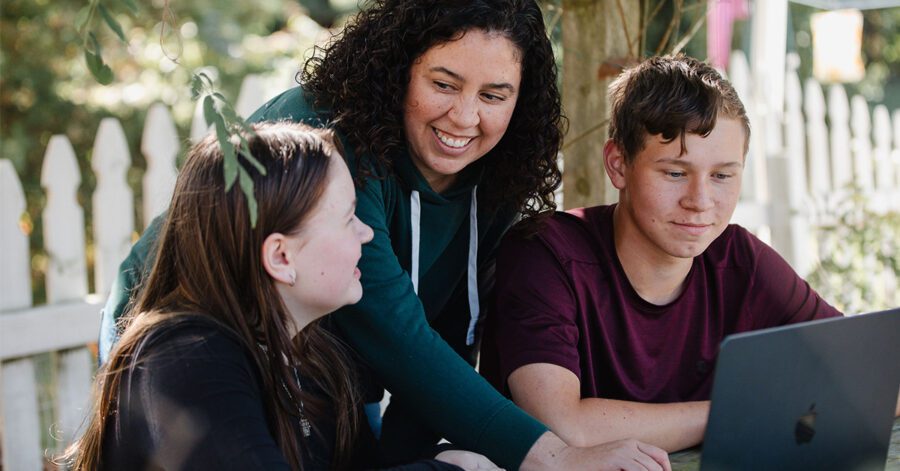Are you standing at the crossroads of your child’s educational journey, weighing the benefits of homeschool versus public school? Choosing how to educate our children might be one of the most important decisions we make as parents. Thousands of parents each year question whether traditional classrooms truly offer the best environment for their children to thrive academically, socially, and spiritually.
The concern is legitimate when public schools continue to face challenges with overcrowded classrooms, standardized approaches that don’t accommodate individual learning needs, and curricula that often separate faith from learning. Kathy Sheppard, former public school teacher turned CC parent, felt this pull and asked: Is there a better way to nurture my child’s unique gifts while providing them with an education grounded in timeless values?
For parents seeking alternatives to conventional education, the growing classical Christian education movement offers a compelling answer. With market analysis from Arcadia Education projecting classical education enrollment to reach 1.4 million students by 2035, more families are discovering what many Classical Conversations parents already know—homeschooling with a classical Christian approach offers distinct advantages that traditional public schooling simply cannot match.[1]
Let’s open the doors of the homeschool vs public school comparison and hear from Kathy Sheppard’s experiences as a public school Latin teacher and a classical homeschool educator.
Educational Philosophy: Purpose-Driven vs. Utilitarian
Classical Conversations Approach
When I talk with other Classical Conversations families, one theme consistently emerges: we’re not just teaching subjects—we’re nurturing souls. One of the most important reasons I love Classical Conversations is because I know the goal is to know God and to make Him known. This is so succinct yet so profound. This simple yet powerful mission statement captures the heart of Classical Conversations’ educational philosophy.
Rather than viewing education merely as preparation for a career, Classical Conversations roots its approach in the timeless pursuit of truth, goodness, and beauty. The classical trivium of grammar, dialectic, and rhetoric provides our children with skills to become lifelong learners who can acquire knowledge, think critically, and communicate effectively.
I had a moment of clarity when I realized, as a public school student and, later, teacher, that I never considered that I was learning and teaching academic subjects in isolation from knowing more about my God.
Of course, now, I realize that all knowledge of truth points to God. This holistic, Christian approach to learning acknowledges that education serves a divine purpose rather than economic utility—it’s about forming character and understanding our place in God’s world.
Public Education Approach
Modern public education, by contrast, often adopts what classical educators would describe as a utilitarian approach. With roots in the Industrial Revolution, public education primarily prepares students for economic participation and workforce readiness. This system typically follows a standardized curriculum designed to ensure students acquire basic competencies measured through standardized testing.
Public education is caught between two competing goals—standardization for accountability and differentiation to meet individual learning needs. The problem is that these approaches often clash, creating a system that pulls in different directions without a clear, unified vision.
Learn more about the difference between Classical and Modern Education.
Curriculum Structure: Integrated vs. Fragmented
Classical Conversations Approach
Have you ever felt overwhelmed by the sheer number of curriculum options available to homeschoolers? One thing I have noticed while working with homeschooling families is that they sometimes tend to switch curricula. The constant search for the perfect curriculum can be exhausting.
That’s why so many of us find relief in Classical Conversations’ approach to quality, classical materials. I love the fact that Classical Conversations has a curriculum that uses the skills of learning for all areas of study. From a planning standpoint, it makes things easier. I also know that the curriculum is tried and true. I have yet to be disappointed in any classical education book or material Classical Conversations has created.
This consistent, comprehensive homeschool curriculum spans from preschool, with the Scribblers program, through high school, ending with the rhetorical Senior Thesis, integrating subjects around central strands of learning rather than treating them as isolated disciplines.
The classical approach deliberately sequences learning to align with our children’s developmental stages, moving them through the classical liberal arts of grammar (language acquisition) to dialectic (logical reasoning) and finally to rhetoric (persuasive expression of Truth).
For parents, one of the most reassuring aspects is seeing the complete educational journey mapped out. What makes me happy about Classical Conversations is that I can see the whole curriculum laid out for students through high school. This integrated structure provides continuity throughout a student’s educational journey, allowing them to make connections across strands and build upon previously mastered concepts.
Public Education Approach
Public schools usually divide learning into separate subjects with fixed curricula that move forward on a set schedule, whether or not students have fully grasped the material. This “one-size-fits-all” approach often makes it hard to meet individual needs. While there have been some efforts to connect subjects, they’re still mostly taught in isolation.
On top of that, public school curricula often change based on new trends, policies, or testing requirements. These constant shifts can leave gaps in students’ learning and make it harder to build a strong, connected understanding of different subjects.
Read more about the Homeschool vs Public School debate.
Personalized Attention: Tailored vs. Standardized
Classical Conversations Approach
Let me share some of my experiences that resonate deeply with many homeschooling parents: Homeschooling is quite a bit more challenging than teaching Latin to public school students for two reasons.
The first is that, although I loved my public school students, I love my daughters more and do not want to hurt their education. This honest confession captures the heart behind our desire to provide individualized attention to our children.
With the parent-student-Tutor partnership that homeschooling provides, Classical Conversations families can truly tailor instruction to each child’s specific strengths, weaknesses, and learning pace. We can spend extra time on challenging concepts and move quickly through material our children have mastered—a flexibility that’s simply not possible in a classroom of 25 students.
Homeschooling is a twenty-four-hour, seven-day-a-week job, and the second reason and one of the most comforting aspects of Classical Conversations is mentorship. The Lord has put mentors along my path who have helped alleviate some of the nervousness I experienced while choosing a different educational path for my children.
I am thankful that my daughters and I have appropriate mentors, such as Tutors, Directors, and other CC parents and friends. This creates a learning community where experienced parents help navigate the homeschooling journey, addressing concerns and providing encouragement. The support system makes all the difference when you’re taking the road less traveled!
Public Education Approach
Public school teachers must manage classrooms with an average of 21-27 students, making individualized attention difficult despite best intentions. These constraints often force teachers to aim instruction at the middle of the class, which can leave advanced students unchallenged and struggling students without adequate support.
While some public schools implement Individualized Education Plans (IEPs) for students with specific learning needs, these accommodations often create new problems rather than truly personalizing education.
Social Environment: Intentional vs. Incidental
Classical Conversations Approach
“But what about socialization?” If you’re a homeschooling parent, you’ve probably heard this question more times than you can count! The irony is that many of us find Classical Conversations specifically because we value meaningful social connections.
Once a week CC communities create intentionally structured interactions that bring students together in a positive learning environment supervised by caring Directors and Tutors who share our Christ-centered worldview. It’s not just about academics—it’s about building a community.
The balance works beautifully: we get the rich, focused learning environment at home most days, combined with the community experience weekly. Our children develop social skills in diverse contexts—with peers during community days, with family members during home instruction, and with various community members through service opportunities and extracurricular activities.
Community days offer accountability for both parents and students and give us the feeling of a new beginning that comes with starting each new academic year in a Classical Conversations community.
Public Education Approach
Public schools offer daily peer interaction, but the quality of this socialization varies greatly. Studies reveal that 5% of students between ages twelve and eighteen reported feeling afraid of attack or harm at school—approximately one student in every average-sized classroom.[2] Issues like bullying, negative peer pressure, and exposure to drugs and alcohol create challenging social environments.
Public schools do offer socialization, but since students are grouped by age, it doesn’t always reflect real-world interactions. Younger kids miss out on learning from older siblings, and older students don’t get as many chances to develop leadership skills by mentoring those who are younger.
Academic Outcomes: Excellence vs. Standardization
Classical Conversations Approach
When we’re deep in the day-to-day of homeschooling—struggling through math problems or revising that fifth essay draft—it’s easy to lose sight of the big picture. That’s why it’s so encouraging to hear from other CC parents who can see the finish line. I talk to students nearing the program’s end and see how they have benefited. I have seen how well they are prepared for the next step in their lives.
What exactly does this preparation look like? Classical Conversations Challenge students (middle and high school students) can debate and wrestle with ideas in philosophy, theology, and history. These don’t just sound like advanced subjects—they are the skills needed for success in higher education and beyond.
The research backs up what we see in our communities. Studies show that homeschooled students typically score higher on standardized tests than their public school counterparts. College performance further validates this approach, with homeschooled students graduating with higher GPAs (3.46 vs. 3.16) and at higher rates (66.7% vs. 57.5%) than publicly educated peers.[3]
This is why seasoned Classical Conversations parents often advise: “If you are a Foundations parent, try to make an effort to get to know the Challenge students. This will help you stay focused on your homeschooling goals.” Seeing the end result makes all those challenging days worthwhile!
Public Education Approach
Public schools tend to define success through test scores and graduation rates, which offer clear numbers but don’t always reflect real learning. This focus often leads to teaching for the test instead of fostering deep understanding and joy for lifelong learning.
As a result, students may memorize facts but struggle with critical thinking when faced with real-world challenges. Research shows that homeschooled students generally perform better academically than their public school peers, regardless of their parents’ education levels—suggesting that how kids are taught matters more than having a degree in education.[4]
Family Involvement: Central vs. Peripheral
Classical Conversations Approach
Homeschooling with Classical Conversations places the family at the center of education. Parents take an active role in teaching, modeling, and guiding their children’s learning journey. This family-centered approach strengthens bonds between parents and children and allows parents to learn alongside their children as lead learners.
The educational process becomes a collaborative family effort, creating opportunities for meaningful conversation and deeper relationships. Parents witness their children’s learning firsthand and are able to speak grace and Truth into every part of their lives.
Public Education Approach
In public education, family involvement often becomes peripheral rather than central to the educational process. Parents typically participate in learning through homework help, parent-teacher conferences, and occasional school events. The limited visibility into daily learning experiences creates a disconnection between family life and education.
Going back to the classical roots, Romans centered education upon family and home as the locus of learning rather than the academy—a philosophy abandoned in modern public education in favor of institutional approaches.
Listen to the Everyday Educator’s podcast to learn more about Family Learning.
Proven Principles in Homeschool Education
When I reflect on my own educational journey, I find myself nodding in agreement with the parent who wrote: “Now that I know the difference, it makes more sense to learn the interrelatedness of all knowledge and the fact that it further points to God.” There’s something profoundly satisfying about an educational approach that connects rather than isolates.
So, is homeschooling better than public school? Homeschooling with Classical Conversations offers a clear alternative to public education’s fragmented and ever-changing nature. While public schools focus on standardized outcomes, homeschooling nurtures both the mind and heart, integrating faith, character, and a love of lifelong learning.
I love that Classical Conversations provides a time-tested approach that equips students with the skills to think deeply and see the connections in all subjects, which ultimately points to God. If you’re looking for an education that begins with a Christ-centered approach and prepares your child for a life of wisdom and purpose, come learn more about Classical Conversations.
I want to know more
Want to read more about classical Christian education in homeschooling? Check out these encouraging resources:
*Special thanks to Kathy Sheppard for her contributions to this article.
[1] https://arcadiaed.com/2024/02/market-analysis-of-u-s-classical-education-in-grades-pk-12/
[2] National Center for Education Statistics
[3] https://nheri.org/research-facts-on-homeschooling/
[4] https://nheri.org/academic-achievement-homeschool-students/




